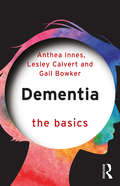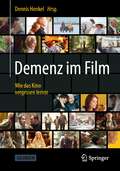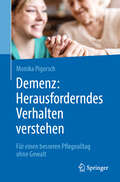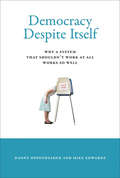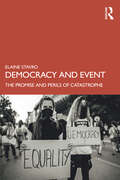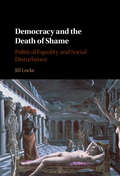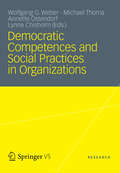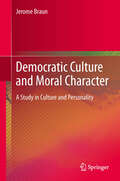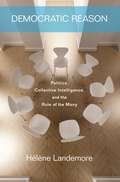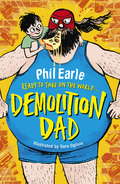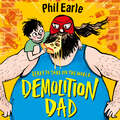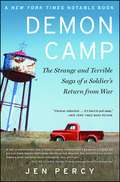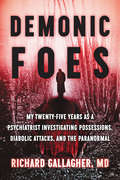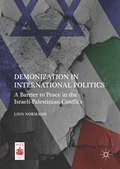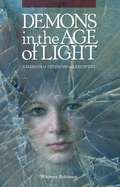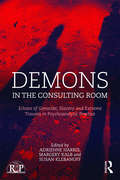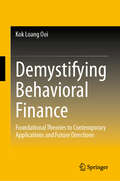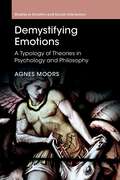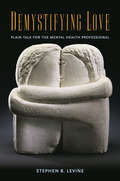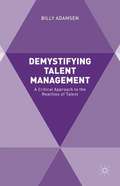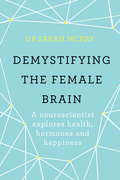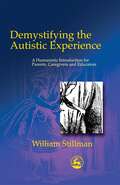- Table View
- List View
Dementia: The Basics (The Basics)
by Anthea Innes Lesley Calvert Gail BowkerDementia: The Basics provides the reader with a clear and compassionate introduction to dementia and an accessible guide to dealing with different parts of the dementia journey, from pre-diagnosis and diagnosis to post-diagnostic support, increasing care needs and end of life care. Co-authored by an academic, a person living with dementia and a family carer, the book endeavours to raise awareness of dementia, challenge stereotypical and negative ideas about what it means to have dementia and champion a society where people living with dementia can be active as they wish for as long as possible. The authors present an overview of current research at each step of the dementia journey as well as including knowledge from lived experience, enhancing understanding and challenging thinking about what it might be like to live with a diagnosis or to care for a loved one. As a whole, the book emphasises the importance of prioritising the person living with dementia, as well as considering the impact of what any initiative or action might mean for them, their families and their care supporters. Offering both an accessible introduction to dementia and practical tools, this book will be ideal for health and social care professionals, students of social care, health care and nursing, people with dementia, carers and anyone wanting to understand more about the condition.
Demenz im Film: Wie das Kino vergessen lernte
by Dennis HenkelSeit der Jahrtausendwende wagen Filmemacher immer häufiger, das gesellschaftlich drängende Thema Demenz in Großproduktionen aufzugreifen - für die große Leinwand mit ihren hochbudgetierten Produktionen war das bis dahin zu brenzlig, kontrovers und für Kassenschlager schlicht ungeeignet. Der Trend setzt sich bis heute fort: Allein 2020 schafften es sechs Großproduktionen um das Thema Demenz, teils mit Hollywoodstars besetzt, in die großen Kinosäle. Das Kino lernt also Vergessen! Die Autoren begeben sich in diesem Buch auf die Spuren dieser Entwicklung und heben gesellschaftlich und künstlerisch bemerkenswerte Aspekte hervor: Sie skizzieren die Perspektive der Erkrankten, der Angehörigen und die filmische Darstellung von Pflegeeinrichtungen. Filme weiblicher Regisseure und Werke aus anderen Kulturen fügen eine antipatriarchische und internationale Sichtweise auf die Erkrankung hinzu und zeigen Standpunkte jenseits stereotyper Vorstellungen auf. Darüber hinaus stellen die Autoren Filme vor, die das Thema “Demenz” mit weiteren umstrittenen Themen verbinden, wie z. B. der Homosexualität. Diese nutzen die Kraft der Fiktion, um uns zukünftige Weltentwürfe zu zeigen, in denen z. B. künstliche Intelligenz und futuristische Techniken Dementen das Leben erleichtern. Das Buch möchte so auf unterhaltsame Weise einen Beitrag zur Aufklärung über Demenz leisten und auch sensibilisieren für die künstlerisch-filmische Aufbereitung einerseits und medizinische Realität andererseits. Es richtet sich an alle kinobegeisterten Leser, ob mit oder ohne medizinisch-fachliche Vorkenntnisse - für unvergessliche Einblicke in das Thema “Demenz im Film”!
Demenz: Für einen besseren Pflegealltag ohne Gewalt
by Monika PigorschIn der Pflege -und Betreuung von Menschen mit Demenz gibt es immer wieder Situationen, die schwierig sind. Ein solches Verhalten ist meist eine Aufforderung an das soziale Umfeld, ein Hilferuf, der viele Gesichter hat. Dieses Buch widmet sich diesem wichtigen Pflegethema. Die erfahrene Autorin zeigt praxisorientiert mit vielen Fallbeispielen auf, wie sich herausforderndes Verhalten im Pflegealltag bei Demenzerkrankten zeigt, wie es vorgebeugt werden kann und welche Maßnahmen sich zur Deeskalation eignen. Viele Konflikte können vermieden werden, wenn wir nicht die Krankheit in den Fokus stellen, sondern den Menschen mit seinen noch vorhandenen Bedürfnissen und Fähigkeiten wahrnehmen. An vielen Beispielen wird deutlich, nur wenn Lebensqualität erhalten bleibt, kommt es zu weniger herausforderndem Verhalten und gewaltsamen Situationen. Davon profitieren die erkrankten Menschen aber auch die Menschen, die sie betreuen und pflegen. Viele hilfreiche Tipps und ein Wahren der Würde und Persönlichkeit des Menschen mit Demenz führen zu einem entspannteren Miteinander. Das Buch richtet sich in erster Linie an alle Mitarbeitenden in Gesundheitsberufen, die in der Pflege und Betreuung von Demenzerkrankten stationär oder ambulant eingebunden sind. Aber auch Angehörige werden darin viel wertvolles Wissen erhalten.
Democracy Despite Itself: Why a System That Shouldn't Work at All Works So Well (The\mit Press Ser.)
by Danny Oppenheimer Mike EdwardsWhy democracy is the most effective form of government despite irrational (and sometime oblivious) voters and flawed (and sometimes inept) politicians.Voters often make irrational decisions based on inaccurate and irrelevant information. Politicians are often inept, corrupt, or out of touch with the will of the people. Elections can be determined by the design of the ballot and the gerrymandered borders of a district. And yet, despite voters who choose candidates according to the boxer–brief dichotomy and politicians who struggle to put together a coherent sentence, democracy works exceptionally well: citizens of democracies are healthier, happier, and freer than citizens of other countries. In Democracy Despite Itself, Danny Oppenheimer, a psychologist, and Mike Edwards, a political scientist, explore this paradox: How can democracy lead to such successful outcomes when the defining characteristic of democracy—elections—is so flawed?Oppenheimer and Edwards argue that democracy works because regular elections, no matter how flawed, produce a variety of unintuitive, positive consequences. The brilliance of democracy, write Oppenheimer and Edwards, does not lie in the people's ability to pick superior leaders. It lies in the many ways that it subtly encourages the flawed people and their flawed leaders to work toward building a better society.
Democracy and Event: The Promise and Perils of Catastrophe
by Elaine StavroCatastrophes unsettle our safe places within the world. As such, they provide an interesting site to analyze the intersection of our affective and political lives. Bringing radical democratic thinking, affect theory, psychoanalysis, and discursive analysis to bear on contemporary catastrophic events, Democracy and Event presents a fresh perspective on the study of affect and its impact on democratic sensibilities and practices. Situated in different countries with differing institutional histories and cultures – the Grenfell Tower fire in London, England (2017); the SARS epidemic in Toronto, Canada (2003); the Parkland shooting in Florida (2018); the early days of the COVID-19 crisis and the murder of George Floyd in Minneapolis, USA (2020) – Elaine Stavro interprets the rhetoric, discourse, and affective communication of politicians and passionate protestors. She examines their linkages to well-established organizations informed by democratic ideals, as well as the context in which they arise, which have a bearing on their ability to challenge neoliberal and authoritarian practices. Inspired by the urgent need to bring theory back to politics and politics back to theory, Elaine Stavro demonstrates how theory might inform our attitudes to contemporary events while recognizing that political action and events cannot be captured in their complexity by theory. Her skillful engagement with various theoretical approaches, read through the lens of catastrophic events, will speak to a wide-ranging scholarly readership in numerous academic fields.
Democracy and the Death of Shame
by Jill LockeIs shame dead? With personal information made so widely available, an eroding public/private distinction, and a therapeutic turn in public discourse, many seem to think so. People across the political spectrum have criticized these developments and sought to resurrect shame in order to protect privacy and invigorate democratic politics. Democracy and the Death of Shame reads the fear that 'shame is dead' as an expression of anxiety about the social disturbance endemic to democratic politics. Far from an essential supplement to democracy, the recurring call to 'bring back shame' and other civilizing mores is a disciplinary reaction to the work of democratic citizens who extend the meaning of political equality into social realms. Rereadings from the ancient Cynics to the mid-twentieth century challenge the view that shame is dead and show how shame, as a politically charged idea, is disavowed, invoked, and negotiated in moments of democratic struggle.
Democratic Competences and Social Practices in Organizations
by Wolfgang Weber Lynne Chisholm Annette Ostendorf Michael ThomaThe contributions in this book address the question of how to develop and foster democratic competences. This may take place via school curricula, resource materials and teaching/learning methods; in workplaces by means of formalised arrangements that encourage self-direction and through the informal processes engendered by expansive working environments; and in personal and community life, including in the course of incidental learning in social networks. The studies and analyses are somewhat nonconformist in its thematic spread and its boundary-crossing between disciplines and perspectives that conventionally live separate lives.
Democratic Culture and Moral Character
by Jerome BraunThis book returns critical theory to its roots in both psychology and the social sciences. It shows some of the relationships between equality in a political and social sense and personal identity that either relates well to such equality, or rebels against it. All this reflects processes of social and cultural influence that involve not only random change but also processes of social and cultural evolution that themselves have effects regarding potentials for self-fulfillment and even public morality. This book provides a framework to help one study the interaction between individual aspirations and social opportunities. Jerome Braun, known for his writings in interdisciplinary social science, an approach he calls pragmatic critical theory, here provides a book that discusses issues relevant to the moral underpinnings of democratic society, including issues of social evolution and of culture and personality. This book will be of particular interest to scholars and students of Psychology (particularly in the areas of Psychology of Personality and Cultural Psychology), Sociology (especially those interested in Sociology of Alienation and Sociology of Culture, as well as Sociology of Mental Health), Anthropology (particularly in the area of Psychological Anthropology), Cultural Studies, and Social Theory in general.
Democratic Reason: Politics, Collective Intelligence, and the Rule of the Many
by Hélène LandemoreIndividual decision making can often be wrong due to misinformation, impulses, or biases. Collective decision making, on the other hand, can be surprisingly accurate. In Democratic Reason, Hélène Landemore demonstrates that the very factors behind the superiority of collective decision making add up to a strong case for democracy. She shows that the processes and procedures of democratic decision making form a cognitive system that ensures that decisions taken by the many are more likely to be right than decisions taken by the few. Democracy as a form of government is therefore valuable not only because it is legitimate and just, but also because it is smart. Landemore considers how the argument plays out with respect to two main mechanisms of democratic politics: inclusive deliberation and majority rule. In deliberative settings, the truth-tracking properties of deliberation are enhanced more by inclusiveness than by individual competence. Landemore explores this idea in the contexts of representative democracy and the selection of representatives. She also discusses several models for the "wisdom of crowds" channeled by majority rule, examining the trade-offs between inclusiveness and individual competence in voting. When inclusive deliberation and majority rule are combined, they beat less inclusive methods, in which one person or a small group decide. Democratic Reason thus establishes the superiority of democracy as a way of making decisions for the common good.
Demolition Dad (A Storey Street novel #1)
by Phil EarleCBBC Book of the Month, June 2017Perfect for fans of David Walliams, Roald Dahl and Liz Pichon, this is a hilarious and warm-hearted story about family, friends and wrestling by multi-award-shortlisted author Phil Earle, illustrated by award-winning artist, Sara Ogilvie.This is the story of Jake Biggs and his dad, George. George spends all week knocking down buildings ... and all weekend knocking down wrestlers! He's the Demolition Man, and Jake couldn't be prouder. But when Jake hears about a pro-wrestling competition in the USA, and persuades his beloved dad to apply, things don't quite turn out the way he expected ...Phil Earle's first novel for younger readers of 9-11, DEMOLITION DAD is DANNY THE CHAMPION OF THE WORLD in Spandex, a book bursting with humour and heart. Perfect for Father's Day this June!
Demolition Dad: a Storey Street novel (A Storey Street novel #1)
by Phil EarleCarnegie Medal shortlisted author Phil Earle's first novel for younger readers, Demolition Dad is Danny the Champion of the World in Spandex - a hilarious, warm-hearted story about family, friends and wrestling, illustrated by Waterstones Children's Book Prize shortlisted artist, Sara Ogilvie, and perfect for fans of David Walliams.This is the story of Jake Biggs and his dad, George. George spends all week knocking down buildings ... and all weekend knocking down wrestlers. He's the Demolition Man, and Jake couldn't be prouder. But when Jake hears about a pro-wrestling competition in the USA, and persuades his beloved dad to apply, things don't quite turn out the way he expected...(P) Orion Children's Books 2017
Demon Camp: The Strange and Terrible Saga of a Soldier's Return from War
by Jennifer PercyA “chilling” (O, The Oprah Magazine), “darkly brilliant” (Bookforum) account of “the effects of war on the psyches of the soldiers who fight” (Esquire).In 2005 a Chinook helicopter carrying sixteen Special Ops soldiers crashed during a rescue mission in Afghanistan, killing everyone on board. In that instant, machine gunner Caleb Daniels lost his best friend, Kip, and seven members of his unit. Back in the US, Caleb begins to see them everywhere—dead Kip, with his Alice in Wonderland tattoos, and the rest of them, their burned bodies always watching him. But there is something else haunting Caleb, too—a presence he calls the Black Thing, or the Destroyer, a paralyzing horror that Caleb comes to believe is a demon. Alone with these apparitions, Caleb considers killing himself. There is an epidemic of suicide among veterans of Iraq and Afghanistan, men and women with post-traumatic stress disorder who cannot cope with ordinary life in the aftermath of explosions and carnage. Author Jen Percy finds herself drawn to their stories. Her main subject, Caleb, has been bringing damaged veterans to a Christian exorcism camp in Georgia that promises them deliverance from the war. As Percy spends time with these soldiers and exorcists—finding their beliefs both repellant and magnetic—she enters a world of fanaticism that is alternately terrifying and welcoming. With “beautiful, lucid” (Los Angeles Times) lyricism, Demon Camp is the riveting true story of a veteran with PTSD and an exploration of the battles soldiers face after the war is over. As The New York Times Book Review said, “Percy’s narrative may confirm clichés about war’s costs, but it artfully upsets a common misconception that all veterans’ experiences are alike.”
Demonic Foes: My Twenty-Five Years as a Psychiatrist Investigating Possessions, Diabolic Attacks, and the Paranormal
by Richard Gallagher M.D.The world’s leading psychiatric authority on demonic possession delves into the hidden world of exorcisms and his own transformation from cynic to believer over the course of his twenty-five-year career.Successful New York psychiatrist Richard Gallagher was skeptical yet intrigued when a hard-nosed, no-nonsense Catholic priest asked him to examine a woman for a possible exorcism. Meeting her, Gallagher was astonished. The woman’s behavior defied logic. In an instant, she could pinpoint a person’s secret weaknesses. She knew how individuals she’d never known had died, including Gallagher’s own mother, who passed away after a lengthy battle with ovarian cancer. She spoke fluently in multiple languages, including Latin—but only when she was in a trance. This was not psychosis, Gallagher concluded. It was, in his scientific estimation, what could only be describe as paranormal ability. The woman wasn’t mentally disturbed—she was possessed. This remarkable case was the first of many that Gallagher would encounter. Sought after today by leaders of all faiths—ministers, priests, rabbis and imams, Gallagher has spent a quarter-century studying demonic activity and exorcisms throughout history and has witnessed more cases than any other psychiatrist in the world today.In this eerie and enthralling book, Gallagher chronicles his most famous cases for the first time, including: A professional who claimed her spiritualist mother had “assigned” her a spirit who “turned on her.”A petite woman—”90 pounds soaking wet”—who threw a 200-pound Lutheran deacon across the room to the horror of onlookers in a church hall;And “Julia,” the so-called Satanic queen and self-described witch, who exhibited “the most harrowing” case, a “once-in-a-century” possession.Going beyond horror movies and novels, Demonic Foes takes you deep into this hidden world, sharing in full details of these true-life tales of demonic possession.
Demonization in International Politics
by Linn NormandThis book investigates demonization in international politics, particularly in the Middle East. It argues that while demonization's origins are religious, its continued presence is fundamentally political. Drawing upon examples from historical and modern conflicts, this work addresses two key questions: Why do leaders demonize enemies when waging war? And what are the lasting impacts on peacemaking? In providing answers to these inquiries, the author applies historical insight to twenty-first century conflict. Specific attention is given to Israel and Palestine as the author argues that war-time demonization in policy, media, and art is a psychological and relational barrier during peace talks.
Demons in the Age of Light
by Whitney RobinsonWith the skill of a gifted novelist, twenty-three-year-old Whitney Robinson recounts the harrowing true story of her descent into mental illness soon after she arrived at college. Her doctor labeled the illness schizophrenia, but Whitney felt that she became possessed by a malevolent, seductive entity that attempted to influence her into harming herself and others. Institutionalized and heavily medicated, Whitney encounters other horrors and mysteries within the walls of a psychiatric hospital. Determined to release herself from pharmacological shackles, Whitney finally confronts and expels her demon through sheer will and alternative methods, including an attempted exorcism and shamanic healing. Whitney's saga parallels current discussions in the media regarding American psychiatry's dependence on drug-based treatments and the renewed interest in alternative healing methods of eastern and indigenous cultures, which, according to a recent New York Times article "The Americanization of Mental Illness," have been revealed to be at least as effective as pharmaceutically driven treatments. Whitney's story of survival and personal growth will serve as a living model for others on radio and television programs.
Demons in the Consulting Room: Echoes of Genocide, Slavery and Extreme Trauma in Psychoanalytic Practice (Relational Perspectives Book Series)
by Adrienne Harris Margery Kalb Susan KlebanoffDemons in the Consulting Room: Echoes of Genocide, Slavery and Extreme Trauma in Psychoanalytic Practice isthe second of two volumes addressing the overwhelming, often unmetabolizable feelings related to mourning, both on an individual and mass scale. Authors in this volume explore the potency of ghosts, ghostliness and the darker, often grotesque aspects of these phenomena. While ghosts can be spectral presences that we feel protective of, demons haunt in a particularly virulent way, distorting experience, our sense of reality and our character. Bringing together a collection of clinical and theoretical papers, emons in the Consulting Room, reveals how the most extreme types of trauma can continue to have effects across generations, and how these effects manifest in the consulting room. Essays in this volume consider traumas that have affected multiple generations of people, such as the Holocaust, experiences in the gulags, and the experience of slavery. Authors here consider the clinical challenges of working with the demonic force in severe childhood abuse and the effects of serious and prolonged physical injury and illness. Inevitably, there is in such difficult clinical work, the combined effects of hauntings in the analysts and in patients and often in the surrounding culture. In this book, distinguished psychoanalysts explore the myriad forms of ghosts and the demonic, which interfere and disrupt the endlessly difficult psychic work of mourning. It will be of interest to psychotherapists and psychoanalysts, as well as social workers, family therapists, psychologists, and psychiatrists. emons in the Consulting Room ill appeal to those specializing in bereavement and trauma and, on a broader level, to sociologists and historians interested in understanding means of coping with loss and grief on both an individual and larger scale basis.
Demystifying Anorexia Nervosa: An Optimistic Guide To Understanding And Healing
by Alexander R. LucasA scientific study of the illness, as well as accounts of recovery and strategies for healing.
Demystifying Behavioral Finance: Foundational Theories to Contemporary Applications and Future Directions
by Kok Loang OoiThis book provides a thorough examination of behavioural finance, charting its development from foundational theories to contemporary applications and future directions. It delves into the psychological underpinnings of investor behaviour, elucidating how cognitive biases and emotional responses shape financial markets. Beginning with the seminal theories such as Prospect Theory by Kahneman and Tversky, the book explores the contributions of pioneering researchers who laid the groundwork for this field. It then transitions to modern behavioural finance theories, presenting significant research findings and their implications for today's financial landscape. Through detailed case studies, the book illustrates the practical application of behavioural finance principles in investment strategies, corporate finance, and personal finance, offering readers valuable real-world insights. Case studies include analyses of market anomalies like the Tulip Mania and the Dot-com Bubble, as well as modern market disruptions such as the 2008 Financial Crisis, the market reactions during the COVID-19 pandemic, and recent events like the GameStop short squeeze and the cryptocurrency market fluctuations. These examples highlight the influence of behavioural factors on market stability and investor behaviour. Additionally, the book investigates emerging trends and technologies, such as AI and machine learning, and their impact on behavioural finance. It also offers a global perspective, comparing behavioural finance across different cultural and market contexts. The concluding section discusses the policy implications of behavioural finance insights and forecasts the field's future trajectory. Aimed at academics, finance professionals, and advanced students, this book is an indispensable resource for those seeking to understand the intricate relationship between psychology and finance, and a significant contribution to the literature on financial behaviour.
Demystifying Emotions: A Typology of Theories in Psychology and Philosophy (Studies in Emotion and Social Interaction)
by Agnes MoorsDemystifying Emotions provides a comprehensive typology of emotion theories in psychology (evolutionary, network, appraisal, goal-directed, psychological constructionist, and social) and philosophy (feeling, judgmental, quasi-judgmental, perceptual, embodied, and motivational) in a systematic manner with the help of tools from philosophy of science, allowing scholars in both fields to understand the commonalities and differences between these theories. Agnes Moors also proposes her own novel, skeptical theory of emotions, called the goal-directed theory, based on the central idea that all kinds of behaviors and feelings are grounded in goal-striving. Whereas most scholars of emotion do not call the notion of emotion itself into question, this review engages in a critical examination of its scientific legitimacy. This book will appeal to readers in psychology, philosophy, and related disciplines who want to gain a deeper understanding of the controversies at play in the emotion domain.
Demystifying Love: Plain Talk for the Mental Health Professional
by Stephen B. LevineIntended primarily for mental health professionals, Demystifying Love deals plainly with topics rarely written about for clinicians. The book discusses in a small package highly readable and useful topics, such as love (as both noun and verb), psychological intimacy, sexual desire, as well as infidelity, both in background concepts and clinical guidelines. As the book shows, love is the logical point of departure for a clinical understanding of sexuality and its problems. It is the most conventional framework for understanding sexual behaviors, the one that is broadly endorsed across many cultures, often as the ideal context for sexual expression. The book integrates an analysis of love in patients dealing with intimacy, sexual desire, infidelity, forgiveness and reconciliation. Detailed with compelling case studies, the author’s skill as a therapist comes through in the discussion of these topics—many of which are at the heart of numerous couple problems. In creating this illuminating work for mental health professionals, Dr. Levine may have underestimated its appeal. Dr. Levine’s ability to shed light on our internal processes as we love and attempt to be loved throughout life may prove to be of interest to a far broader audience.
Demystifying Talent Management: A Critical Approach To The Realities Of Talent
by Billy AdamsenDemystifying Talent Management questions the explanation of talent, that anyone who has 'more' has a talent, and demonstrates how the term 'talent' has become an empty signifier. The book asks if talent exists at all, and reflects on what the consequences for talent management within business and sports would be if this were the case.
Demystifying The Female Brain: A neuroscientist explores health, hormones and happiness
by Dr Sarah McKayUnderstanding how your brain works during the key stages of life is essential to maintaining your health. Dr Sarah McKay is a neuroscientist who knows everything worth knowing about women's brains, and shares it in this cutting-edge, essential book.This is not a book about the differences between male and female brains, nor a book using neuroscience to explain gender-specific behaviours, the 'battle of the sexes' or 'Mars-Venus' stereotypes. This is a book about what happens to the brains of women as they cycle through the phases of life, which are unique to females by virtue of their biology and in particular their hormones.In Demystifying The Female Brain, Dr McKay gives insights into brain development during infancy, childhood and the teenage years (including the onset of puberty) and looks at pregnancy, motherhood, and mental health.The book weaves together findings from the research lab, interviews with neuroscientists and other researchers working in the disciplines of neuroendocrinology, brain development, brain health and ageing, along with stories and case studies.
Demystifying the Autistic Experience: A Humanistic Introduction for Parents, Caregivers and Educators
by William StillmanParents, caregivers and educators are often at a loss about how best to support an individual with autism because they are overwhelmed by 'behaviours', inundated with prognoses and clinical jargon, or confused by technical information. This book introduces autism from a non-clinical, humanist perspective, emphasizing that we are all more alike than different. The author deconstructs the fundamental concepts of the autistic experience using language, examples and anecdotes that are concrete and understandable for all. Reinforced for the reader is the importance of listening carefully to what people are telling us about valuing differences, personal passions, communication, and holistic wellness.
Den Dingen auf der Spur: Zum Umgang mit Gegenständen in Kindheit und Jugend
by Petra Götte Wiebke WaburgIm Band wird die Frage nach der Verankerung von Dingen in sozialen und kulturellen Praxen von (und mit) Kindern, aber auch von (und mit) Jugendlichen in den Fokus gerückt. Es geht darum, wie sich im Umgang mit den Dingen leibliches Erleben entfaltet, wie Dingen Bedeutung zugeschrieben wird, wie sie zu Symbolen werden, wie mit ihnen Übergänge, Rollen- und Geschlechterstereotype, generationale und kulturelle Differenzen, Machtverhältnisse und Regierungsspielräume konstituiert, aber auch verschoben werden.
Den Kurs des Lebens selbst bestimmen: Acht Strategien, die Sie auf Ihrem Kurs unterstützen können
by Rachel S. HeslinSind Sie es leid, sich in so viele Richtungen gezogen zu fühlen, dass Sie nicht wissen, welchen Weg Sie einschlagen sollen? Hören Sie auf, am Rad zu drehen und beginnen Sie zu leben! Dieses Buch ist für Sie, wenn Sie: - immer "zu viel" nachdenken - so sensibel auf die Emotionen anderer reagieren, dass Sie sich nicht sicher sind, wo Sie aufhören und wo jemand anderes anfängt - sehr kreativ sind - die Welt mit Leidenschaft zu einem besseren Ort machen wollen - sich nach so viel mehr sehnen als dem Leben, das Sie derzeit haben, aber nicht wissen, wie Sie es erreichen können. Wenn das nach Ihnen klingt, wird Ihnen "Den Kurs des Lebens selbst bestimmen" zeigen, wie Sie: - den Unterschied zwischen Ihren Träumen und den Zielen anderer Menschen erkennen - wie Sie Ihre große Vision mit den nächsten Schritten in Einklang bringen - lernen, wie Sie den Schwung aufrechterhalten können, auch wenn Sie sich nicht danach fühlen ... und vieles mehr.
